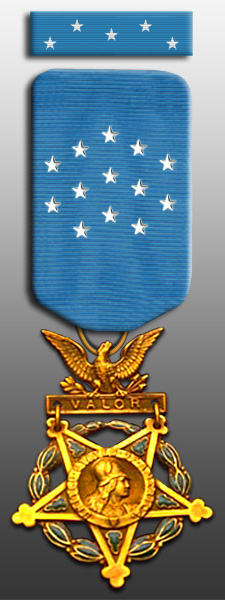
|
| 1904 Gillespie Medal of Honor
|
Audie Murphy was the recipient of America's highest decoration known as the Medal of Honor. Originally authorized by congress during the Civil War this medal has had several versions since 1862. The version earned by Audie Murphy was authorized for the Army in 1904 and is known as the "Gillespie" version. It was issued to Medal of Honor recipients in the Army through the end of World War II but was later replaced with another, more recent version.
The action which resulted in Audie Murphy earning the medal occurred on January 26, 1945. On that day, German forces launched a determined counter-attack with the objective of taking back important wooded terrain known as the Bois de Riedwihr near the town of Holzwihr, France.
This terrain had been previously seized by elements of the 1st and 2nd Battalions of the 15th Infantry regiment, 3rd Infantry Division.
To retake it, the Germans advanced toward the woods with two companies of dismounted infantry and six heavy tanks. The wood line was defended by 2nd Lieutenant Audie Murphy, who had assumed command of B Company earlier that day when the only other officer was badly wounded by mortar fire.
At 2nd Lieutenant Murphy's disposal were eighteen enlisted soldiers - a little more than a squad sized unit. This was all that remained of B-Company.
Just before the battle began, two poorly armed M10 tank destroyers were attached to B-Company with the hope of countering vastly superior German armor. Each M10 had a small, short-barreled 3-inch M7 anti-armor gun tube and a single .50 caliber machine gun.
With the exception of indirect artillery, no other fire support was available to 2nd Lieutenant Murphy and his men on that cold icy day. Making defense harder was the fact that the frozen ground made it very difficult to dig foxholes.
When the Germans appeared, an 88 millimeter German gun scored a direct hit on one of the tank destroyers. The other tank destroyer was quickly taken out of action too. Germans tanks and dismounted infantry began to overrun B-Company's position. 2nd Lieutenant Murphy ordered his men to withdraw while he alone remained to direct artillery fire using a telephone. Several German tanks were knocked out action by accurately placed artillery rounds.
At some point, Lieutenant Murphy left his position, taking the portable wire-connected telephone with him, and climbed on the burning tank destroyer. Doing this made it tougher for him to be spotted because of flames and smoke. It also gave him access to its .50 caliber machine. From his new position, Murphy continued to adjust artillery fire while he fired the machine gun between between transmissions.
Eventually the field telephone stopped working when its line was probably cut or destroyed. Although exhausted and nearing his physical limits, Lieutenant Murphy continued firing and reloading belted ammunition from the .50 caliber machine gun at the advancing dismounted Germany infantry. Eyewitness accounts estimated that Germans managed to get as close as 10 yards of Murphy's position. Fortunately, the Germans were having a difficult time locating the source of the murderous fire being poured on them.
While he stood on it, Lieutenant Murphy's tank destroyer took at least one and probably two direct hits from 88 millimeter German shells. Amazingly, he was never more than only briefly stunned by their explosions although the force of one reopened a shrapnel wound he received the previous day in a mortar barrage. Regardless, Murphy managed to continue engaging the advancing infantry killing scores.
After nearly an hour of fierce fighting with an estimate of 50 Germans infantry dead and several German tanks destroyed, the remaining German tanks began to withdraw. They did so probably because of the heavy losses suffered by the supporting infantry which was crucial to the tank's protection.
As Germans forces retreated with heavy casualties, Lieutenant Murphy only then dismounted the still-burning tank destroyer and rejoined his men, refusing medical aid, and began organizing a counter-attack. Even though the tank destroyer was heavily loaded with unfired ammunition and gasoline, it miraculously never exploded until just after Murphy climbed down from it (Simpson, pages 153-160).
| 


